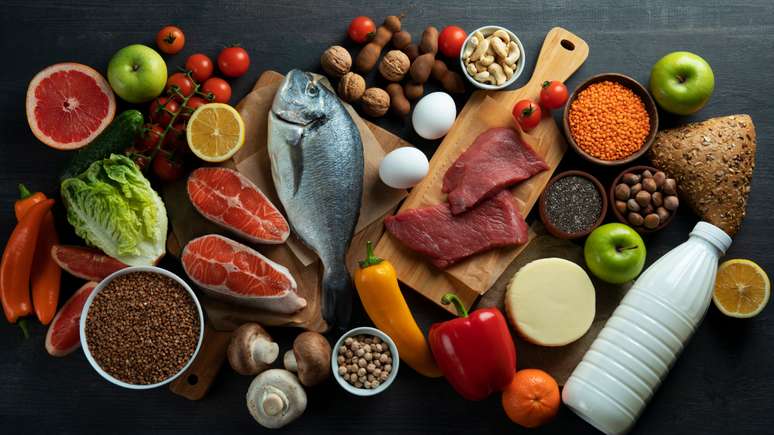We obtain vitamin B12 indirectly through foods of animal origin. In this week’s column, Jamar Tejada outlines what causes the nutrient to be deficient and how to supplement it
You spoke of a “veggie” diet, so we thought of vitamin B12, cobalamin, a well-known vitamin among vegetarians or vegans, given that the food sources of this vitamin are usually of animal origin and its deficiency causes various damages to health .
html[data-range=”xlarge”] figure image img.img-fa9855dd951d4bfa484a5c0f14999fb45p3rh41d { width: 774px; height: 435px; }HTML[data-range=”large”] figure image img.img-fa9855dd951d4bfa484a5c0f14999fb45p3rh41d { width: 548px; height: 308px; }HTML[data-range=”small”] figure image img.img-fa9855dd951d4bfa484a5c0f14999fb45p3rh41d, html[data-range=”medium”] figure image img.img-fa9855dd951d4bfa484a5c0f14999fb45p3rh41d { width: 564px; height: 317px; }
But its shortage doesn’t only affect vegans and vegetarians, no. In Brazil, to give you an idea, according to data from the POF (Pesquisa de Budgets Familiares) between 2017 and 2018, 7.2% of adult men in the country had inadequate consumption of vitamin B12, while the number reached 17.1% in adult women.
A study conducted in 2019 by the National Study of Child Food and Nutrition shows a 14.2 percent prevalence of micronutrient deficiency in children under five. In the elderly aged between 65 and 74 it is about 5% and in those over 75 the inadequacy is more than 10%.
In addition to veganism or vegetarianism, red meat, for example, which contains vitamin B12, is not affordable for the entire population.
Vitamin B12
Vitamin B12 is not produced by our body. The interesting thing is that we obtain this vitamin indirectly through foods of animal origin (meat, eggs, milk and their derivatives) because vitamin B12 is present in the bacteria that exist in the soil and which release the nutrient when they are degraded by the digestion of animals herbivores, which consume them together with roots and grass.
Once ingested, vitamin B12 is absorbed in the small intestine through a process involving a protein called intrinsic factor. B12 is also a water-soluble vitamin (water soluble), which facilitates its renal elimination (through the urine), making hypervitaminosis (overdose) of B12 quite rare. But, on the other hand, it makes its deficiency more common either due to the low consumption of food sources, or due to the poor absorption of this vitamin, or even due to its easy excretion.
Therefore, vegetarians or vegans are among the main risk groups for vitamin B12 deficiency, as are the elderly, those undergoing bariatric surgery and those with diseases of the gastrointestinal tract that impair its absorption (such as Crohn’s and celiac disease). In addition, the use of drugs such as omeprazole, ranitidine and metformin, among others, can also impair their absorption.
Even HIV-positive patients who have the disease in its active form have difficulty absorbing nutrients and may have low levels.
What causes a lack of vitamin B12 in the body?
Tiredness, tremors, muscle weakness, muscle spasticity, hypotension, gastrointestinal disorders and mood swings are some of the symptoms of its deficiency and, in the most serious cases, it can lead to the development of megaloblastic anemia, a very serious problem.
One of the most important roles of vitamin B12 in our body is the production of red blood cells, the famous red blood cells responsible for carrying oxygen in our body. This production is called erythropoiesis. When there aren’t enough levels of vitamin B12 in the body, this production is impaired, which causes cells to become larger and lack the ability to transport oxygen properly. Therefore, due to insufficient tissue oxygenation, the individual feels tired.
Vitamin B12 also participates in cellular metabolism, as a cofactor for enzymes, such as those involved in the synthesis of nucleic acids – the basis for building DNA.
Another very important role is in the production of the myelin sheath, the fatty layer that covers the axons of neurons, contributing to the transmission of nerve impulses. The more impaired this communication between neurons, the greater the chances of neurological symptoms such as headaches, mental confusion and memory impairment. Therefore, it is indicated for cases of lack of memory and even depression.
Some studies even show a relationship between vitamin B12 deficiency and increased risk of stroke (Cerebral Vascular Accident), precisely because this nutrient deficiency increases the risk of neuropathies and cardiovascular diseases.
An analysis in the Journal of Bone and Mineral Research also concluded that a lack of this micronutrient may be a major risk factor for osteoporosis, affecting bone formation.
Although there are still few studies in humans, evidence points to a correlation between vitamin B12 deficiency and an increased susceptibility to obesity, as cobalamin is known to be involved in fat metabolism. Some animal studies suggest that its deficiency may also predispose to weight gain and metabolic disorders.
What tests look at vitamin B12 levels?
The serum vitamin B12 test, which measures blood levels, is a good indicator to find out the levels of this nutrient in the body. He can also evaluate homocysteine and methylmalonic acid dosages, as their levels rise when he is deficient.
What are the foods richest in vitamin B12?
Find out which are the best sources of vitamin B12 and the amount in 100 g, according to the Brazilian food composition table:
- Beef liver: 72.2 mcg
- Chicken liver: 18.9 mcg
- Shellfish: 12 mcg
- Tuna: 8.19 mcg
- Chicken heart: 7.57 mcg
- Sardines: 7.32 mcg
- Oysters: 3.63 mcg
- Crab: 3.91 mcg
- Salmon: 3.13 mcg
- Beef: 2.53 mcg
- Boiled egg: 1 mcg
- Yogurt: 0.29 mcg
- Milk: 0.37mcg
Is it possible to integrate?
The deficiency is treated through supplementation with cyanocobalamin, methylcobalamin, hydroxocobalamin, or adenosylcobalamin, which are forms of vitamin B12. Cyanocobalamin is one of the most common forms found in supplements due to its stability and low cost. But in our body it must be converted into the active forms of vitamin B12.
The other three forms are similar to those found naturally in dietary sources of this vitamin. Methylcobalamin and adenosylcobalamin are the active forms. The last two are more suitable because they have better bioavailability – easier to metabolize – and methylcobalamin is the most common in Brazil. Additionally, supplementation can be done orally or injected, as appropriate.
Do you understand now why the importance of this vitamin? Consult a nutritionist or doctor and let’s pursue the dreamed balance.
Source: Terra
Ben Stock is a lifestyle journalist and author at Gossipify. He writes about topics such as health, wellness, travel, food and home decor. He provides practical advice and inspiration to improve well-being, keeps readers up to date with latest lifestyle news and trends, known for his engaging writing style, in-depth analysis and unique perspectives.








